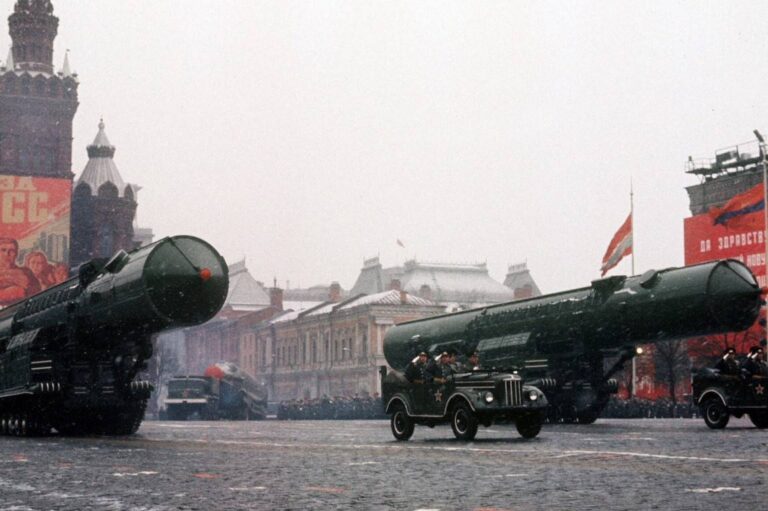Nuclear weapons are the most powerful and destructive weapons ever created by humans, capable of causing massive destruction and loss of life. As of 2023, six major countries in the world are known to possess major nuclear weapons. These countries are the United States, Russia, China, the United Kingdom, France, and North Korea.
Together, they possess an estimated total of over 10,000 nuclear warheads, with the United States and Russia accounting for most of them.
Table of Contents
The major countries which possess nuclear weapons today
These countries’ possession of nuclear weapons has significant implications for global security and the potential for catastrophic events. We will look at each of these countries and their nuclear capabilities.
Russia
Russia is one of the world’s leading nuclear powers, possessing a significant arsenal of nuclear weapons. As of 2022, Russia has around 5,977 nuclear warheads, with around 1,625 of them deployed and ready for use.
Russia’s nuclear program began during the Soviet era and has since maintained a policy of nuclear deterrence. Russia’s nuclear arsenal is made up of various types of warheads, including ICBMs, SLBMs, and strategic bombers.
Russia has also been involved in several arms control agreements with the US aimed at reducing the number of nuclear weapons in the world. However, there have been concerns in recent times about Russia’s compliance with these agreements, and some experts have warned of a new arms race between Russia and the US.
The United States
The United States is one of the world’s leading nuclear powers, possessing the largest arsenal of nuclear weapons globally. As of 2022, the US has an estimated 5,428 nuclear warheads, with around 1,750 of them deployed and ready for use. The arsenal contains various types of warheads, including intercontinental ballistic missiles (ICBMs), submarine-launched ballistic missiles (SLBMs), and strategic bombers.
The US nuclear program began in the 1940s as part of the Manhattan Project, which developed the first nuclear weapons. The United States was the first country to use nuclear weapons in warfare, dropping atomic bombs on the Japanese cities of Hiroshima and Nagasaki in August 1945.
The US is also a leading advocate for nuclear non-proliferation and has signed several arms control treaties aimed at reducing the number of nuclear weapons in the world.
However, the US has faced criticism for its nuclear policy, with some arguing that its possession of nuclear weapons contributes to global instability and increases the risk of nuclear war. The US has also faced criticism for the modernization of its nuclear arsenal, with some experts arguing that it could lead to a new arms race with Russia and China.
China
China is one of the world’s leading nuclear powers, possessing a significant and growing nuclear arsenal. They have around 350 nuclear warheads, 170 of them deployed and ready for use.
The country’s nuclear program began in the 1950s. It has since maintained a policy of minimum deterrence. The purpose is to maintain a sufficient nuclear arsenal to deter other countries from attacking it.
China’s nuclear arsenal comprises various types of warheads, including ICBMs, SLBMs, and strategic bombers. China is also a part of several arms control agreements with the US and Russia. This is to reduce the number of nuclear weapons in the world.
The United Kingdom
The United Kingdom is one of the countries that possess nuclear weapons. As of 2022, the UK has around 225 nuclear warheads. The UK has around 120 of them deployed and ready for use.
The UK is a part to many several arms control agreements. This is aimed at reducing the number of nuclear weapons in the world.
France
France is among the leading countries with nuclear weapons. An estimated 290 nuclear warheads, of which around 170 are deployed and operational as of 2023. Its nuclear program started in the 1950s.
France uses its nuclear arsenal to prevent potential aggressors from attacking it or its allies. France’s nuclear arsenal includes submarine-launched ballistic missiles (SLBMs) and strategic bombers, among other warheads.
North Korea
North Korea has around 30-40 nuclear warheads. Its nuclear program began in the 1980s and has faced significant international criticism and sanctions for its pursuit of nuclear weapons. North Korea has ballistic missiles among the various types of warheads that make up its nuclear arsenal.
North Korea has repeatedly stated that its nuclear program is necessary for self-defense against the United States and its allies. It has conducted several nuclear tests and missile launches violating UN resolutions. These actions have raised concerns about the stability of the Korean peninsula and the potential for a nuclear conflict.
The international community has made efforts to negotiate with North Korea and achieve denuclearization of the Korean peninsula. Progress has been slow, and tensions remain high.
Nuclear weapons have global security implications
These countries have varying policies and levels of transparency regarding their nuclear programs. Their possession of nuclear weapons has significant implications for global security and the potential for catastrophic events.
Opinions differ on nuclear weapons, with some viewing them as essential for deterrence and national security. While others see them as contributing to global instability and raising the risk of nuclear war. Several arms control agreements have aimed at reducing the number of nuclear weapons in the world, but there are still concerns about compliance and the potential for a new arms race.
It is crucial that the international community continues to work towards nuclear disarmament and strengthening the non-proliferation regime. The risks associated with nuclear weapons are too great to ignore. Efforts must be made to decrease the probability of their use and eventually eradicate them entirely.
Read also: New Start nuclear treaty, what the suspension decided by Putin means












